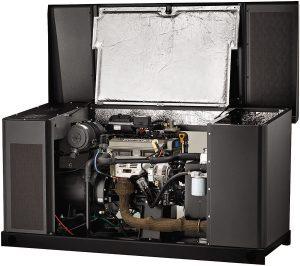 Hurricane force winds have the power to damage many things, including the electric infrastructure powering your home or business. One way to strengthen your property against an extended power outage is to purchase a natural gas powered standby generator.
Hurricane force winds have the power to damage many things, including the electric infrastructure powering your home or business. One way to strengthen your property against an extended power outage is to purchase a natural gas powered standby generator.
If you’re trying to decide if a standby generator is right for you, consider this information from the City of Tallahassee’s Natural Gas Utility.
How does a standby generator work?
Standby generators are designed to automatically provide electricity to your home or business during a power outage. The standby generator’s automatic system constantly monitors utility power 24/7. When it detects a service issue, the automatic transfer switch (ATS) will safely disconnect the utility service provider’s power and connect to the generator’s power. This design eliminates the harmful back-feeding of electricity. Standby generators continue to monitor utility power and will reverse the switch when the power outage ends.
Unlike a portable generator, the transfer switch is completely automated; you do not need to activate any switches. Because standby generators run on natural gas (or propane in areas without natural gas service), you don’t need to find and transport gasoline to power the unit.
Most standby generators are designed to exercise themselves once a week, a function that can be set/adjusted. During this exercise period (approximately twelve minutes), the engine is lubricated, the battery charged and a diagnostics check is run. Some manufacturers offer diagnostic reporting inside the home or business to alert you to any potential programs associated with the standby generator’s operation.
What is the difference between standby and portable generators?
Standby generators are permanently installed at your home or business and automatically supply electricity to your property or selected circuits during a power outage. Portable generators supply electricity to selected appliances through extension cords and are typically fueled by gasoline, which can be difficult to obtain, store and transport during an emergency situation. Carbon monoxide is always a concern in the safe use of portable gasoline powered generators, as are the weather conditions in which you must operate in order to hook up the portable generator to selected appliances.
Natural gas offers a safe, long-term fuel supply to the standby generator, offering a more environmentally friendly option to gasoline or diesel fuels. Additionally, unused fuel in a gasoline powered generator will naturally start to break down within three months and can become unusable within one year.
What components and features come with a standby generator?
 When choosing a standby generator, make sure it comes with the following main components:
When choosing a standby generator, make sure it comes with the following main components:
-Main Alternator Unit
-Automatic Transfer Switch
-Generator Fuel Shut-off Valve
-Automatic Shutdown Protection System
-Factory-warranted Generator Enclosure
The engine in a standby generator can be cooled by air or liquid. Air-cooled generators are better suited to small homes (less than 2,400 square feet) and serve as backup power for selected circuits in the home. If you have a large home, multiple air conditioning units (either window or central air), several large appliances or medical equipment that needs constant power, you might want to consider a liquid-cooled model, which will provide backup power for the whole house and light commercial applications.
What should I budget for a standby generator?
The cost of a standby generator depends on several items, including the basic equipment, installation, permit applications and fuel source. Generally, a standby generator system should cost between $9,000 and $12,000 (product and installation). A standby generator alone can cost as little as $2,000 depending on the size and use.
Where should I buy a standby generator?
You can buy your standby generator from a local retailer, online retailer or from a generator dealer who will offer installation and service. Whichever method you choose, make sure it comes from a reputable store or dealer and with a comprehensive warranty.
How should I choose my standby generator’s wattage?
The most important factor in choosing a standby generator is that it will provide enough energy for your safety and comfort. The more circuits and appliances you want to power, the more wattage you’ll need.
An average home’s essential appliances will operate on an air-cooled standby generator with 7,000 – 22,000 watts of power. High wattage comfort appliances, such as central air conditioners, pool heaters and dryers, require a lot of electricity when first started up, so that may influence the size of the generator you need or how many appliances you will be able to power. Also, living in a warmer climate can mean a larger air conditioner that may require more dedicated circuits to the standby generator.
Most appliances are rated for running wattage (the amount of electricity necessary to run the appliance) and surge wattage (the higher amount of electricity needed to start electric motors commonly found in household appliances, such as central air conditioning or refrigerators). To accurately tabulate your wattage requirements, check the appliances’ user manuals or the data plate on the back of the appliance. A certified electrician can also provide an accurate reading of what your needs will be based on the appliances and circuits you want routed to the standby generator during an outage.
What fuels are used in a standby generator?
Standby generators run on several different fuels; however, natural gas is the only fuel source that can provide consistent and reliable energy without calling for fuel deliveries or worrying about depleting your fuel tank.
Where should I locate my standby generator?
Most standby generators don’t take up any more space than a central air-conditioning system. In most cases, utility customers have them installed in close proximity to their central air unit outside their home. A standby generator should always be positioned in a well-ventilated outdoor space and never next to a window, door or fresh air intake due to potentially harmful carbon monoxide exhaust. Never position the exhaust of the standby generator to blow hot air on an air conditioner compressor. National building and fire code requirements must be followed to ensure safe installation; you should check with local codes to see if there are setback guidelines in your area. A qualified generator dealer should be consulted before placement to confirm these requirements are met.
Should I install a standby generator myself?
No, it is strongly recommended that you have your final generator connections completed by a licensed professional. Some utility customers take the initiative to place and mount the various components but rely on professionals for electrical and gas connections, as well as the proper permitting. Installation by a professional ensures proper operation, safety and maintenance of the equipment warranty.
 Please remember to check with the business that sells you the standby generator about applicable permits that you may have to obtain to install or operate the device. Many businesses will obtain these permits for you as part of the installation contract. By obtaining proper permits, the City of Tallahassee will be aware of your standby generator. This will help electric utility workers restoring power after an outage, protecting them and you from issues.
Please remember to check with the business that sells you the standby generator about applicable permits that you may have to obtain to install or operate the device. Many businesses will obtain these permits for you as part of the installation contract. By obtaining proper permits, the City of Tallahassee will be aware of your standby generator. This will help electric utility workers restoring power after an outage, protecting them and you from issues.
How can I find out about natural gas availability in my area?
Contact the City of Tallahassee’s Natural Gas Utility at (850) 891‑5112 or online at Talgov.com. ![]()
City of Tallahassee




